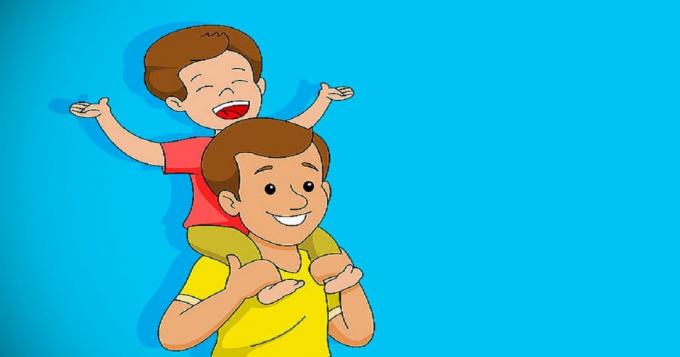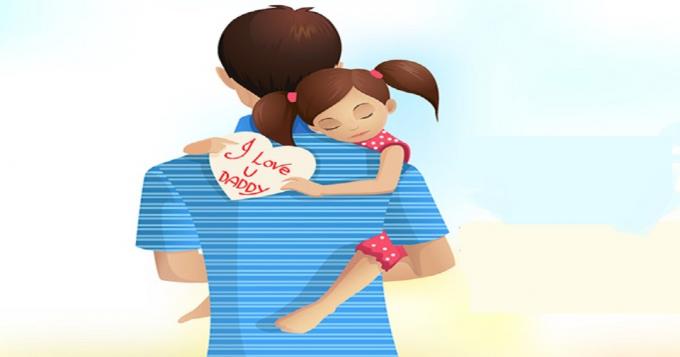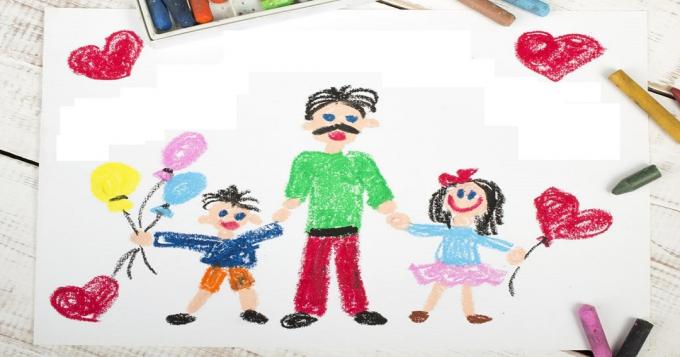
In this post we have selected excellent tips and templates ready for your parent's day lesson plan for early series (Early Education and Elementary School).
O Father's Day, as well as the Mothers Day is celebrated annually in the second sunday in august in Brazil.
In schools across the country, teachers use this commemorative date to develop classroom activities. And it was thinking about this and ways to make it easier for you that we selected these templates ready for your father's day lesson plany, check:
Index

Gifts with a touch given by children are much more valuable to them and to their parents.
Material Used: 01 pair of mesh slippers, fabric paint and/or colored glue, molds, sulfite and brush.
Objective:
Stimulate students' creativity and allow them to feel active subjects, as they will be the artists creating their work to honor someone so important.
Development:
Hand out bond sheets to your students and ask them to share how they feel about the person who created it. After better mastering the technique, they can start painting on their slippers.
Distribute pairs of slippers, paint and/or glue for your students to decorate their gift, let them loose the creativity and imagination to make the painting you want representing your feeling about the mesh of the slipper.
3In special cases, cut out frames in the format you prefer, such as: flower, heart, etc., then students can paint inside this frame, thus decorating their work. Another suggestion is to have the children stamp the palm of the hand or the sole of the foot on the front of the slipper.
After the creativity show, use a space for the slippers to dry, then just pack and make a card.
This workshop, in addition to bringing the children closer to their caregivers by giving them a gift, will also be stimulated in their fine motor coordination, in addition to exploring their creative potential and working on their ability to express yourself.
Hand in hand, we will walk together. (Sentence about Father's Day slippers)
Mommy my peace. (Sentence about Mother's Day slippers)
The result is children artists and happy gifts.

Parent's Day Lesson Plan for Elementary School
Objectives to be achieved:
Procedures:
FATHER'S DAY - (Melody: Terezinha de Jesus)
Between family parties,
There is Father's Day;
Let us always try to love them
Being really nice kids.
To our dear parents,
We pay this tribute,
asking them to forgive us
All our prank.
beside mommy
Let us keep it with gratitude,
the dear daddy
Right into the heart!
Children who do not have the biological parent present should attend class normally.
It is up to the teacher to deal with the subject naturally and talk about the different families existing in the days of today, making it clear that the honored FATHER is the man who gives us love and affection, regardless of ties consanguineous.

Father's Day Lesson Plan for Starter Series
We believe that the family is the foundation that gives meaning to life, allowing human beings to experience true happiness in the small gestures and attitudes of everyday life. We were not created to live in isolation, but to live with one another cultivating the fundamental values: respect, obedience, dialogue and help. The understanding of these values must start in the family, as a child who learns to cultivate love, respect, obedience, will develop an integral and healthy conscience in any environment.
It is up to the school to encourage the child to cultivate these values, acting as a partner of the diversified family models that are established today. As a result of the current social dynamics, the father figure has undergone significant changes, related to the human conception, as well as the massive entry of women into the labor market. These changes influenced various social institutions, resulting, for example, in different formats of family, marriage, parent-child relationship. The concept of father also changed: it went from the condition of biological support to social support. This means there are many parents: adoptive, biological, heart… They are grandparents, uncles, family friends, teachers… On the second Sunday of August we celebrate Father's Day.
During the weeks leading up to this date, we will develop a series of activities for students to focus on the father, his virtues, his values, his work, his home.
It is necessary to awaken in the child, feelings of love and gratitude to the father.
General objectives
Specific objectives
Conversations on the circle, dialogue about family composition;
Researches
jokes and games
Songs related to the theme
Making posters
Painting, cutting and pasting prints
Souvenir and card making for Father's Day
Oral and Written Language:
Suggestions: Guess How Much I Love You (Sam Mcbrantney), Can Dad? (Carlos Jorge), Pinocchio; The green Beetle; My first picture book (expanding vocabulary);
Math:
Nature and Society:
Visual arts:
Song:
Suggestions: Love You (Barney); Dad my friend (melody ciranda, cirandinha); Illuminates (Ivete Sangalo).
Movement:
Identity and Autonomy
Assessment
According to the opportunities explored during the development of the project, countless concepts are formed and objectives achieved. It will be carried out continuously and systematically throughout the development of the project, through observations and monitoring of the proposed activities, considering the capacities, interest, assimilation and individualities of each kid. The educator will use an accurate diagnosis of the child's conceptual level, producing a written verbal report of activities carried out by the children on the proposed topic.
VII. Project culmination
Father's Day Party with music and poetry presentations, exhibition of posters and panels, games and games.
See too: 4 Party Favor Ideas for Father's Day
GOALS:
CONTENTS:
First day:
Second day:
Do all people have parents?
how should we treat our father?
Third day:
Fifth day:
Sixth day:
Also check: Father's day joke
Declaiming comics.
"I'm little
the size of a button
I carry daddy in my pocket
And mom in the heart
I'm little,
of the thick leg,
Short dress,
Dad doesn't like it.
I stepped on the pebble
Pebble rolled.
I winked at the good guy
Good guy liked it.
I told Mom Mom didn't even call.
I told dad…
Slipper sang!
Subscribe to our email list and receive interesting information and updates in your email inbox
Thanks for signing up.


